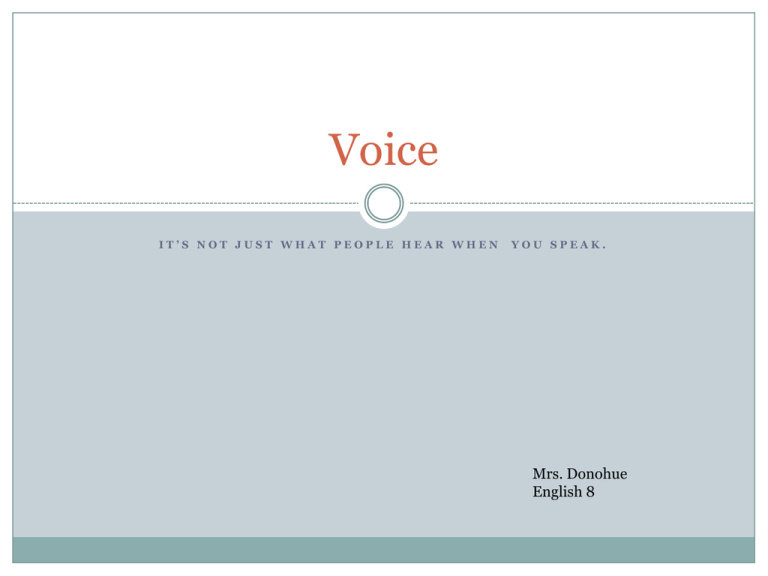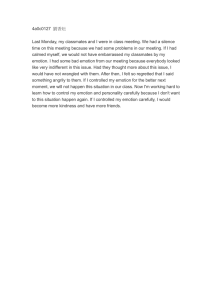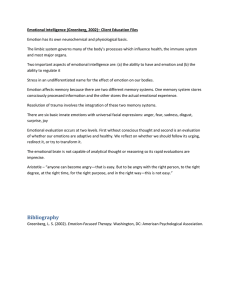Voice Mrs. Donohue English 8
advertisement

Voice IT’S NOT JUST WHAT PEOPLE HEAR WHEN YOU SPEAK. Mrs. Donohue English 8 What is Voice? Voice is: Your writing style Your personality What makes the writing come alive for a reader A form of creative expression Let’s Practice By using our physical Partner B says to Partner voice Find a partner and sit across from them. Partner A says to Partner B: “I want to go.” Say it while trying to communicate the emotion that you’ve drawn from the envelope. A: “I want to go” using the emotion they have pulled. Think not just about how you use your voice and inflection, but also how you use your body language. As humans. . . We have a lot of experience using our physical selves to express what we mean and what we want to say, and we practice constantly with how to engage our audience. It is harder to do that in writing. It just is. However, it is essential if we ever want to be considered good writers (and we all do). Let’s look at a written example. On July 18, 1998, the best thing to ever happen to humanity occurred. John Jacob Jingleheimer was born. It all began in Pensacola Naval Hospital, where John was brought into this world. Despite the fact that some (namely his older sister) said he looked like a “fat, egg shaped, rotisserie chicken”, he was destined for greatness. However, this great individual’s life was paved with hardships. At the early age of 1, John moved from the beauty of Pensacola, to the drab landscape of Beale AFB. Here’s the “opposite.” Mary Elizabeth Howard was born on May 2, 1998. Her parents were excited to have her. She had a cute face. People said. She had a brother and a sister. They were older. She liked cereal the most. When she was growing up. She also liked fruit. Her favorite was pears. She once fell down off a slide and broke her arm. Her parents were scared. She cried a lot. She had to wear a cast for 6 weeks. What is the difference between the two? One should reach out and grab you and make you want to keep reading. The other isn’t necessarily boring, but it’s writing you won’t remember. We want to create writing that others will remember. Otherwise, what is the point? Prompt: Who is better at survival? Guys or girls? Men and women have some extremely strong qualities . . . And some pretty weak ones, as well. However, if they were each dumped on an uncharted island in the middle of the ocean, who would survive? In my opinion, a male would be more likely to survive, even though there are tough females out there. (sentences cut) It is a known fact that ON AVERAGE, males have more upper body strength. If a man were stranded on an island, they could use this advantage to hunt better. Also, they may be able to cut through branches or pick up colossal rocks to construct a shelter. A man would be more likely to climb up a tree to reach a stubborn coconut, or perhaps reach a better view of their location. Strength is one quality that would prove most useful in a situation such as this. Continued . . . Not only are men scientifically stronger in the body, but, to me, they would be better in the mind in a deserted-island scenario, as well. Men wouldn’t grieve for what they have lost as much as women. They would spend more time diligently working, and less time fretting about loved ones, bugs, etc. Having a more robust mindset also comes in handy when you must eat anything – ANYTHING- to survive. From my experience and previous knowledge, a man handles blood and gore and hunting animals better than a woman. If your survival situation calls for killing an animal, you must obey if you truly want to continue on. What would it sound like without voice? Using a partner, take that same idea (a man can survive better than a woman) and create a piece WITHOUT voice. The one that sounds the most wooden or mechanical wins! What did you use to make it sound that way? Was it harder or easier than you might have thought? So, what can we do to create voice? We have already discussed a lot of strategies. What are they? Sentence variety Sentence beginnings Good opening Details (using all 5 senses) Giving reactions and emotions There’s more! Wait, wait, there’s more (especially in creative writing): Adding dialogue that: Adds to the characters Adds to the plot Moves the story along Direct / indirect characterization Flashbacks Developing real characters Try modeling after a writer that you like / enjoy But in the end, remember that YOUR voice is YOUR voice and it needs to feel real to you. Now, let’s try it in your writing! Flip in your notebook to your writing workshop section. Divide it into 3 sections. Draw a slip that will tell you a scenario, or something that is going on. Draw a slip with an emotion. Start writing with that emotion until time is up. Draw another emotion and start writing the same scenario, reflecting that other emotion, until time is up.


